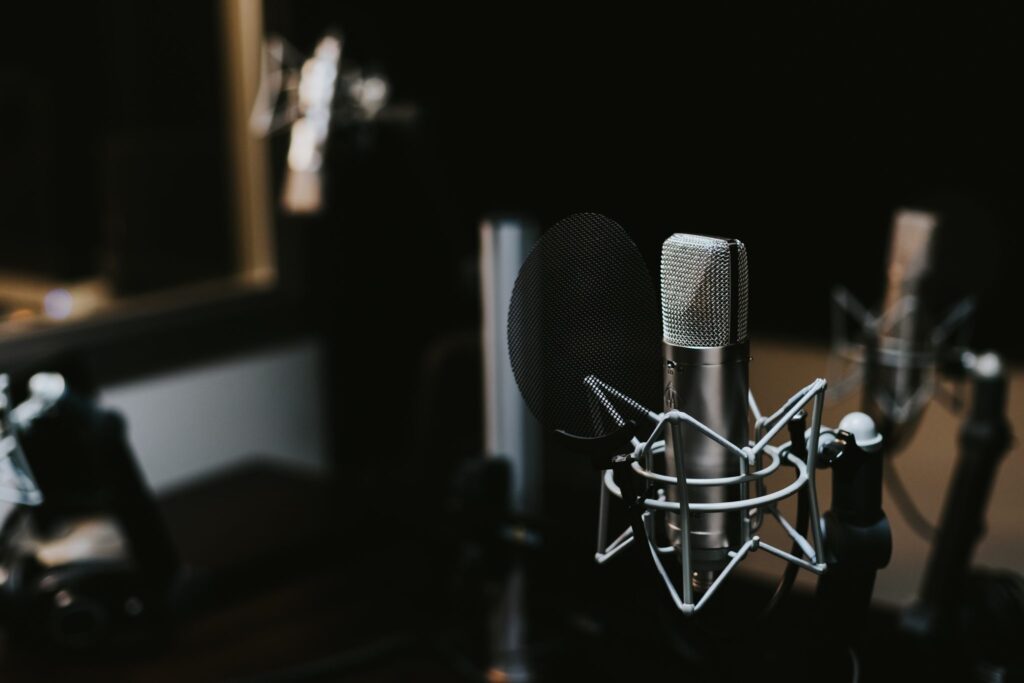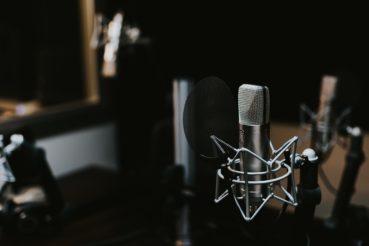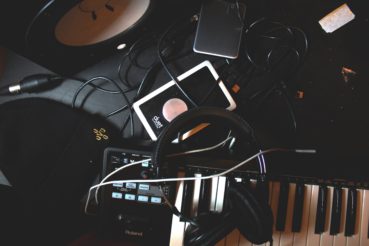9 steps for successful podcasting
31 July 2017 By Northern Lights

Podcasts are on the rise as a tool for businesses and organisations, and they can be a great way of delivering insights and drawing in clients or consumers to your brand or company. Listenership of podcasts has grown steadily in recent years with focusbiz quoting research from leading podcasting company RawVoice that shows the number of people listening to podcasts has tripled in the last five years.
Podcasting can add value to a business, service or product. They can
- Build authority through thought leadership and association
- Give you access to new audiences
- Help you learn more about your target audience through insights or discussions with guests
Getting up and running with a podcast can seem daunting, but it is easier than many people think. To make a success of your podcast all you need is the right plan, equipment, tools and resources.
Before recording your first episode, there are some key things you need to consider and get clear.
Pick your podcast theme
If you are a business, you are likely to focus on your product or service. Charities will want to talk about the issue on which they focus. However, you can be as broad as you like – covering a wide variety of topics – or you can focus down on a particular niche. The TED Talks Daily series, for example, has a top-rated podcast series ranging across all the different topics their speakers come to discuss, while the Soft Skills podcast just focuses on skills for software developers.
The most important thing is to pick a theme you are interested in and passionate about, and that fits your goals. Bringing in guests to discuss a topic is a great way of generating compelling content for every episode and including different viewpoints.
The more passionate and knowledgeable you are about a subject, the more fun you will have, and that is one of the keys to creating an engaging podcast that people will want to listen to.
Think about podcast episode length and format
How long do you want your podcast to be? Player FM lists some of the top business podcasts and most run for between 15 and 30 minutes. It is best to stay shorter at the beginning – your content should be relevant and punchy, and you will need to factor in any extra time for intros or music. It also means that you might be able to get two podcasts out of one recording.
Apple in particular rank podcasts on the number of downloads and subscribers of each podcast. Which means that having two shorter podcasts rather than long one is a good idea – shorter podcasts are more likely to be listened to, and this helps to bump a podcast up the ‘list’ that users see when they open their podcast app. Being higher up the list makes it easier for people to find your podcast in the future.
It is also best to plan out what sections your podcast will have. Most have a short introduction explaining the theme of that week’s podcast, the central section with discussion and then a wrap-up – sometimes talking about what’s coming up next time. If you decide to do this, set a timer for each section to give you a guide.
Voices.com provides some easy to follow guidance on how to plan your podcast timings.
Think about writing a script for your podcast
Scripting a podcast can help create polished and professional sounding episode – something that sounds similar to what you might hear in a news cast or documentary.
We debated this in our office – for some people scripting is essential to remember what to say and when to say it. Other people felt like it was tough to read from a script and sound convincing and natural.
Ad-libbing and going off script is fine and so is writing out cue cards or bullet points instead of a full, word-for-word plan if that’s easier for you.
If you do go for a script, think about your target message – what are you trying to communicate? Make sure that runs through the conversation.
Think about SEO when you are scripting – adding in your key words will make it easier for Google to pick up, especially if you transcribe it after recording.
You want a style that is conversational and friendly. Industry jargon can put people off, and a script helps to avoid falling into those patterns.
Don’t panic about getting through the script perfectly if you do decide on that approach. Lots of people won’t be able to read a script and sound convincingly natural. That’s ok – your script is a guide, so you know what you want to say and in what order.
Whichever way you decide to go – full script, bullet points of ad-libbing, – always make sure to ask people to subscribe at the end of the podcast – the more subscribers you get, the more listeners you will have next time.
Decide how often you are going to post your podcast
Most podcasts post a new episode either weekly or biweekly, but for a business podcast you might want to consider starting at once a month or even less frequently – it is more important to have good, engaging content than to be posting every week.
Before you launch you should have a few podcasts “in the bank” – three is a good number and lets you roll out your podcast with enough time to see what works and steer towards that.
Get the right software and hardware for your podcast
There are lots of different software offers out there on the market for recording and hosting your podcast.
For recording and editing, Audacity is a good option for anyone starting out. It lets you record live audio directly into the application, or you can import from a variety of audio files like MP3 and WAV. Acoustica Basic Edition is another free option with recording and editing features, but you will have to pay extra for multitrack editing and other advanced features.
For hardware, the best sound quality usually comes from an external microphone as opposed to a smart phone or other portable device. The CAD 37 and Fifine USB Plug & Play can both plug into a computer using USB for recording purposes.
Alternatively, there are some more portable options including the Zoom range, which has the the Zoom H2n portable recorder or the H4n Pro which has connectors for external microphones. Some of these options may seem expensive but remember that without decent audio, you do not have a podcast, so go for the best you can afford.
It is worth considering a set of headphones. They do not need to be expensive – all you need is a decent pair of headphones so you can hear yourself and any guests you might have on the show. They help to understand the different audio levels more precisely so you can adjust if anything is wrong
Practice and record your podcast
Once you are all geared up, it’s time to practice. And practice again. And again.
Use your script as a guide and have a friend, a colleague or someone else sit in for any guests. Run through until you can deliver your sections clearly and smoothly and keep your guests in mind when practising. Ask your sit-ins for feedback and make sure they are honest. Most people do not get it right the first time round; that’s fine, just keep working on it and you will get there.
Once you are confident, you can go ahead and do the recording. Don’t worry about getting things perfect first time. There’s a lot to think about so take it easy and remember you can always do a re-take if things do go badly.
Editing your podcast and uploading to a host site
Post-production editing is key to getting an excellent quality podcast. Editing is a skill in itself, so it is best to start simple – make sure your vocal levels are roughly the same for each speaker and tighten up any dead spaces between phrases.
Make sure other sounds like background music are quiet so you can hear your speakers clearly and trim down the conversation, so it fits in with the timings you decided on previously.
You can spend a lot of money on editing software, but free recording software like Audacity has editing functions in there that can help at the beginning.
Once you are happy with your recording, you can upload to a hosting site.
Websites like WordPress and SoundCloud can host audio files, but they are not dedicated to podcasting and can be a bit inflexible sometimes.
Two top rated sites designed specifically for podcasting are Libsyn and Blubrry. These both let you host a podcast through their system and post it elsewhere and will do the technical “back room” work for you like indexing. They will also give you ways to link to your podcast, RSS feeds and help promote your podcast to Apple and Google, so they will eventually appear on their podcasting apps. Their plans start from $5 a month for beginners.
Using music in your podcast
Most professional podcasts use samples of music – most commonly in the intro with a bit of voiceover to introduce an episode or to wrap things up in the outro.
You don’t need to use music – if you have great, compelling content you can do without and still have an engaging podcast.
There are also copyright issues around using music. They are complicated, and the podcast host explains here why it’s best to avoid using any music unless you are completely sure you have permission.
If you do want to use music, Jamendo is a service that offers music for use in podcasts and videos. Some of the music is free, but it is worth exploring to see what is on offer.
Promoting your podcast
Your podcast needs listeners so promoting it through your social media networks is essential to build up your base. Post notifications to Facebook, Twitter, Instagram and other networks whenever new podcast episodes are available. You can expand the content with additional links and insights from the podcast – maybe you wrote a great blog based on the ideas in the podcast, or there’s a news story related to your discussion, for example.
There we have it – 9 steps to help anyone get podcasting. Podcasts are a growing medium despite the growth in video content online – like radio remaining popular long after the popularity of television. They take work to plan but are a great way of getting a message out there and speaking directly to your customers or audience so give it a go – see what works and happy podcasting!
Here’s a flavour of what our team are listening to at the moment to give you an idea of what a great podcast should sound like:
Listen to Lucy – by Lucy Kellaway, the FT’s former management columnist
Guardian Politics Weekly – weekly goings on in UK politics with Anushka Asthana & Heather Stewart
5 Live Consumer Team – Money Saving Expert Martin Lewis is joined by Adrian Chiles for debate and tips on how to make the most of your money


